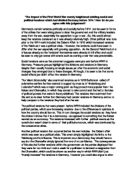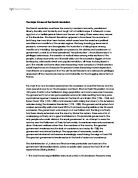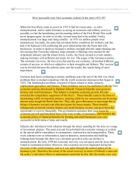"Explain why it was Stalin rather than Trotsky who succeeded Lenin as ruler of the USSR"
The Succession of Lenin - Stalin or Trotsky 24th January 2004 "Explain why it was Stalin rather than Trotsky who succeeded Lenin as ruler of the USSR" After Lenin's death in 1924, there was a struggle between the leading Bolsheviks to succeed Lenin as leader of the USSR. In the end, it emerged as a contest between Leon Trotsky and Joseph Stalin. There were several reasons why it was Stalin rather than Trotsky who succeeded Lenin, and it is these I shall be exploring in this essay. Trotsky seemed like the obvious successor, and consequently he became inactive. He was over-confident, arrogant, and failed to take any threat seriously, least of all the quiet Stalin and so did nothing to try to discredit Stalin or reverse the damage Stalin did to him. In late 1923, when Trotsky needed to be at his most active, he became ill with a malaria-like disease. He also failed to use his popularity in the Red Army to his advantage or to stop his removal from the Politburo or office of Commissar for War. Trotsky's inactiveness resulted in people thinking Stalin was better than him. Trotsky was unpopular in the party because of his inactiveness in increasing his popularity within the party. He couldn't rely on the vote from other party members as he regularly offended leading Bolsheviks like Zinoviev and Kamenev. A series of arguments with them heightened by Trotsky's 'The Lessons of
"Foreign success; domestic failure." How fair is this summary of Bismarck's governance of Germany
"Foreign success; domestic failure." How fair is this summary of Bismarck's governance of Germany It is not fair to state that Bismarck failed domestically, however it is true to some extent that his foreign policies, in terms of success and to some extent importance, did overshadow his practically and theoretically limited domestic policies. It could be argued that these limitations were not because of Bismarck's political mismanagement but because of the social and political situation Germany held at the time. Bismarck was confronted by several impediments. The fact that Bismarck was faced with a religiously and socially disjointed federal state, holding several different political parties within the Reichstag, offered only hardship for domestic control. His position was further weakened due to his absence from Berlin, as a result of his poor health, reducing his control of the every day decision making. After 1871, Bismarck was persistently thwarted in his efforts to shape the domestic developments of the Reich. Bismarck's main domestic aim was to achieve unity within Germany. There was urgency for the need of legislation to establish an economic and legal framework for the Empire. Bismarck's influence over William gave him an immensely strong position, which he exploited. Bismarck ensured that other ministers were little more than senior clerks, carrying out his orders.
"Great-power politics rather than principles dominated the Vienna Settlement of 1915." Discuss
"Great-power politics rather than principles dominated the Vienna Settlement of 1915." Discuss It is hardly surprising that the Settlement was dominated by the Great Powers for it was they who, at great cost, had defeated Napoleon and only they who had the strength to bring the turmoil that he had created to an end. So the most delicate negotiations and the key decisions took place, outside the formal sessions of the Conference, between the statesmen representing the victorious powers. The scheming of Talleyrand won France a place in the inner discussions but the representatives of the lesser nations were kept away from the decision-making. The Settlement is often studied through a survey of Great Power representatives, motives, tactics and rewards. At the end of this essay it will be argued that this situation does not necessarily mean that principles had no part to play in shaping the settlement of Europe. A lot may depend on how one defines a principle. The territorial arrangements arrived at offer a clear indication of the significant part played by Great Power politics. The Tsar Alexander pursued the traditional Russian policy of expansion westwards in order to provide deeper defences for the heart of his kingdom, securing both Finland and Poland for his pains. Hardenberg of Prussia had great ambitions to obtain all of Saxony... What the Great powers wanted in the
"Guilty men" - how responsible were Chamberlain et.al for World War Two?
Guilty men Neville Chamberlain was 68 years old when he succeeded Baldwin as PM on 28th May 1937. It was a post for which he would never fight a general election. As he was being groomed as future PM, he became more critical of policy decisions, sure that he could do better on foreign matters, and his diary recorded a constant lament. He felt that Hitler was the 'bully of Europe', and decided to hope for the best, and plan for the worst. Chamberlain embarked on a policy of deterrence and appeasement, searching for 'decency even in dictators'. Chamberlain saw war as the ultimate absurdity, and he desired peace at all costs. However, he believed in the principle of the 'vital cause', one which if you went to war for, and won you could say 'that cause is safe'. Chamberlain's view that Britain was 'a very rich and a very vulnerable empire' was supported by the idea that Europe was divided between two ideologies. He believed that it was up to Britain to defend itself, holding France and the league of nations in low regard, with similar views towards the US. He was always quick to refute support for certain ideologies, claiming total indifference to Nazism, Fascism and Bolshevism. Chamberlain believed that a nation should not make threats unless it can back them up with action, and that foreign policy is dictated by circumstances. The criticism of Chamberlain came strongly,
"HITLER'S ECONOMIC POLICIES (1933-45) WERE ONLY CONCERNED WITH PREPARATION FOR WAR, AND THEN SUPPLYING THE NEEDS OF WAR."HOW FAR DO YOU AGREE WITH THIS STATEMENT?
"HITLER'S ECONOMIC POLICIES (1933-45) WERE ONLY CONCERNED WITH PREPARATION FOR WAR, AND THEN SUPPLYING THE NEEDS OF WAR."HOW FAR DO YOU AGREE WITH THIS STATEMENT? At the start of the period, Hitler had to deal with a number of problems-when the /Nazis came to power the German economy was not in a very good state and Hitler had this as his foremost concern. However, with the recovery of the economy came a clearer focus on preparation for war, and after the introduction of the 4-year plan in 1936, we can consider that there was a significant leaning towards this aim. In 1933, the German economy showed significant weaknesses in all its major areas. Although it was in fact at the end of the cycle of depression this was not yet clear and the recovery of the economy was of prime importance for Germany. Hitler himself also had little involvement at this stage- his interest was mainly ideological and he had limited economic understanding. Nazi economic policy in these early years revolved around traditional socialist principles; for example the nationalisation of industry, and focused on reducing unemployment and building up infrastructure. Schacht, who was in charge of running Germany's economy at the time, used deficit financing to encourage farming and small businesses with the aim of stimulating economic growth and promoting loyalty to the Nazis in a political twist to his
"How far do the sources suggest consistent aims in Mussolini's foreign policy 1922-39?"
Will Taylor 12G1 HISTORY COURSEWORK ASSIGNMENT PART A "How far do the sources suggest consistent aims in Mussolini's foreign policy 1922-39?" Source 1 suggests that Mussolini has no consistent aim in his foreign policy, and that it was "optimistic and egotistic". Graham states that the foreign policy was "not based upon principles" but instead is a mercenary policy, doing anything that would benefit Mussolini's reputation within Italy. It suggests that Mussolini is taking an altruistic approach to foreign policy, and at the same time his foreign policy is purely "based on opportunism". There is a failure by Graham to perceive any coherence in Italian foreign policy, which may have been perfectly true in 1923. This source comes from the British ambassador of the time, and there would be little incentive to lie about current proceedings, and his information would need to be honest because it is being directed at the "His Majesty's Government". Despite the information in this source, it is clear in Source 3 that by 1939 Mussolini certainly does have a planned foreign policy. Source 3 is Mussolini stating his foreign policy aims to the Grand Council. His aims are clearly to gain control of the Mediterranean and gain passage to the oceans. It logically outlines considerations and how to achieve these aims. One of Mussolini's considerations is the resistance Italy would eb faced
"In all that he did, his main aim was to secure himself in power." How far do you agree with this judgement on Napoleon's policies as First Consul?
"In all that he did, his main aim was to secure himself in power." How far do you agree with this judgement on Napoleon's policies as First Consul? After the Coup of Brumaire in 1799, Napoleon emerged as the new leader of France and devised a system of government that gave him effective control over all aspects of life in France. He controlled religion, education, law-making, policing, legal reforms and the economic situation by putting in place a series of policies, designed both to comply with some principles of the Revolution whilst also giving Napoleon control and security in power. This essay looks to investigate how far each of these policies suggest that Napoleon's main aim was always to secure himself in power. Napoleons policy of police and propaganda is the most obviously repressive of all the policies. Many aspects of his heavy policing conform with dictatorial regimes, as does his policy of censorship and (often false or manipulated) propaganda. France became effectively a Police State, with Napoleon at the core. The Minister of Police, Joseph Fouché, who controlled National Security, established a network of informers who monitored public opinion and reported on any suspicious political activity. They also monitored everyday life in France: the education system; prisons; food supplies; conscription and public works. All findings were written in a daily report,
"Italy Unified Itself". To what extent is this statement true?
Bianca Nardi History HL - Mr Nash "Italy Unified Itself". To what extent is this statement true? The end of Napoleonic Italy and the Risorgimento movements demonstrated that the dream of Italian Unity could be a reality. The unification can be seen as the inevitable end to any means which the Italian states could have undertaken politically. Victor Emmanuel's predecessor, Charles Albert, claimed in 1849 that "Italia farà da sò" (Italy will do itself)). To what extent was his prediction accurate? The Risorgimento movements in the Nineteenth Century are characterized by being a national revival which led to the creation of the Italian Kingdom. Revolutionary outbursts against the absolutist rule of restored monarchs were undertaken by different revolutionary groups who had little common aims and lacked organization. Thus, the sole means by which the Italian people could share their ideas was through the secret societies. Of these, the one which stood out was the Carbonari, who had their base in Naples. The secret societies had unclear aims and hadn't the competence to work towards and united Italy. The revolutionaries' main flaw was that they consisted almost entirely of the educated middle class and did not gain popular support which would have been crucial for their success. However, they
"Little more than a show and a sham" Discuss this view of Mussolini's economic policies.
* "Little more than a show and a sham" Discuss this view of Mussolini's economic policies. Mussolini's economic policies included the battle for lire, grain and land as well as the idea of Corporativism and state intervention during the worldwide depression following the Wall Street crash. All of his policies involved a propaganda, or 'show', element to them. This highlighted their success and hid their failures. To decide whether his economic policies were a show and a sham, each separate part of his policies need to be looked at. Mussolini wanted Italy to be 'great, respected and feared'; he tried to achieve this through his economic 'battles'. The fact that they were called battles shows that Mussolini wanted to use them for propaganda purposes. The biggest show of Mussolini's economic battles was the Battle for Land. This battle aimed to turn Italy's unusable marshland into land that could be used to build city's upon and for agricultural purposes. 80,000 hectares of former marshland was drained and tuned into useable land, this was only one-twentieth of the propaganda claim. Two new cities were created and used to impress foreign journalists. The battle for land produces very little success but was used as propaganda for the fascist regime; it was a complete show. The Battle for Lira was another one of Mussolini's economic propaganda battles. The aim of this battle was
"The Bolsheviks did not seize power, they picked it up." How well does this statement describe the Bolshevik's success in October 1917?
"The Bolsheviks did not seize power, they picked it up." How well does this statement describe the Bolshevik's success in October 1917? In a coup on 25/26 October 1917, Lenin's Bolshevik Party suddenly and effortlessly got rid of Kerensky's Provisional Government. The issue to consider is whether the leadership of Trotsky and Lenin or the disunity of their opponents gave the Bolsheviks success in the October revolution. On the night of 24 October the Bolsheviks staged a coup, engineered by Trotsky; aided by the workers' Red Guard and the sailors of Kronstadt. They captured the government buildings and the Winter Palace in Petrograd on 25-6 October 1917, and the Provisional Government was arrested. This was done with relative ease, as the Bolsheviks were able to do this over a short time period and there was no resistance created by the Provisional Government. Only five people were killed during these events- mostly shot by stray bullets. Mobs only entered, looted and vandalized the Winter palace after it ceased to defend itself. During this piece of work I will assess the Provisional Government's "weaknesses" against the Bolshevik's "assets". Did the Bolsheviks seize power because they made provisions, or because the Provisional Government did so little to obstruct them? In the period of February-October the provisional Government had many complications that lowered their



























